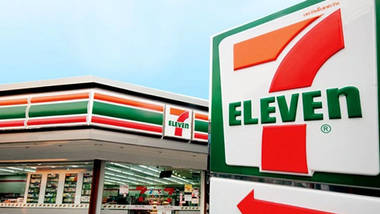

The Aussie owners of 7-Eleven stores in this country have just sold their business to the Japanese parent of the international chain for a cool $1.71 billion, after starting with one store in Melbourne’s Oakleigh in 1977. Business success like this doesn’t surprise me after spending two weeks in London and confronting the brand names of countless Australian business success stories.
Today alone in London I saw a Flight Centre store in the finance district and then there was a huge building development with a Multiplex sign out the front on the scaffold. Of course, you can’t miss Top Deck travel buses and then there are the Bill’s restaurants from Oz that are called Granger & Co over here because another Bill beat him to the punch with that name. Even Kylie Minogue, another Aussie ‘business’ is playing at the Royal Albert Hall.
OK, I’ve made my point. We Australians can do business — a point Rupert Murdoch has rammed home to the world over the past 60 years.
Following this tradition, the Withers and Barlow families had over the year opened 750 stores across the Australia but have now checked out, selling their local business to Japan’s Seven & I Holdings.
According to the AFR, there was a bit of competition for this asset, as the following attests to: “Sources said underbidders Platinum and Ampol went deep into the second round but couldn’t match the winning bid’s price or terms. The deal valued the Australian business at about 8-times historical EBITDA, on an enterprise value to earnings basis.”
Most of us think 7-Eleven is an American business and it was founded in 1927 in the US and is still headquartered in Texas. But it has been in Japanese hands since 1991, when supermarket giant, Ito-Yokado, acquired a 70% stake in the company.
Apart from the petrol it often sells, I’ve always thought its strongest appeal are the slurpees that were one of the great marketing exercises of modern times. The 7-Eleven website says a slurpee is more than a frozen drink — “It’s a lifestyle!” But it was also an economics winner. Here's the reasoning about the Slurpee from thelowdownblog.com: “Iced innovation. Super-sized drink, super-sized margins. That pretty much sums up the economic appeal of the Slurpee beverage. The reality is that cheap, fast and big sells well, fast and big. If you can then produce it with a minimal amount of effort and cost, you have a winner!
“7-Eleven, the convenience store empire, recognised early on that it needed high margin products of its own in order to make up for the paltry returns it received from packaged goods manufacturers for all the candy, soda, snack foods and other unhealthy items its customers demanded.
“The Slurpee - originally, the Icee - fitted that bill. Basically, heavily diluted sugar water and carbon dioxide, its ingredients were inexpensive, it defined convenient: fast and easy. In fact, it was so cheap that it could be offered in extra-large containers as a way of convincing customers they were getting a deal, despite the fact that they were probably spending more on gas to get to their nearest 7-Eleven than they were saving on the extra ounces of whatever it was they thought they were buying.”
Slurpees aside, the Withers and Barlow families anticipated and rode the wave of change that has made convenience stores a part of modern life.
They populate service stations. They take countless CBD corners and stay open for hours that normal, old fashioned shop owners would never accept.
Apart from giving Australian kids and the adults who remained young at heart too much sugar, the company came a cropper over incorrect wage payments.
This is how the guardian.com told the story in October 2020: “Employees of 7-Eleven franchises have been paid back $173m in underpaid wages, interest and superannuation, according to the fair work ombudsman.
“The workplace regulator said on Friday that 7-Eleven had implemented payroll improvements after a report in 2016 found that some franchisees had “deliberately falsified records to disguise the underpayment of wages” and 7-Eleven had failed to detect or address the breaches.”
Inquiries into these wage dramas didn’t find the franchisor had in-built bad wage practices but franchisees had done the wrong thing. As The Guardian pointed out at the time: In 2017, the Coalition introduced laws to increase the maximum civil penalties for serious contraventions of the Fair Work Act.
Franchisors and holding companies are now responsible for contraventions by their franchisees or subsidiaries where they knew or ought reasonably to have known of the contraventions and failed to take reasonable steps to prevent them.”
So indirectly, 7-Eleven’s mistakes have resulted in a better franchise system and a better wage environment for many workers in these retail operations.
All that aside, the 7-Eleven story in Australia underlines the potential pay-off for business builders when they understand the changing nature of consumers.